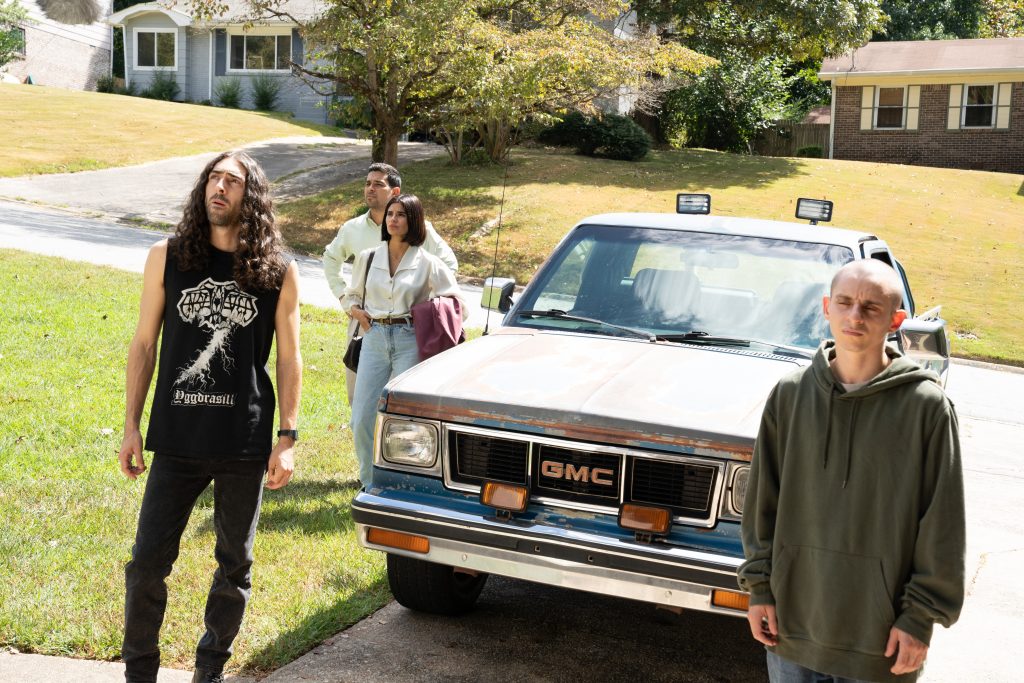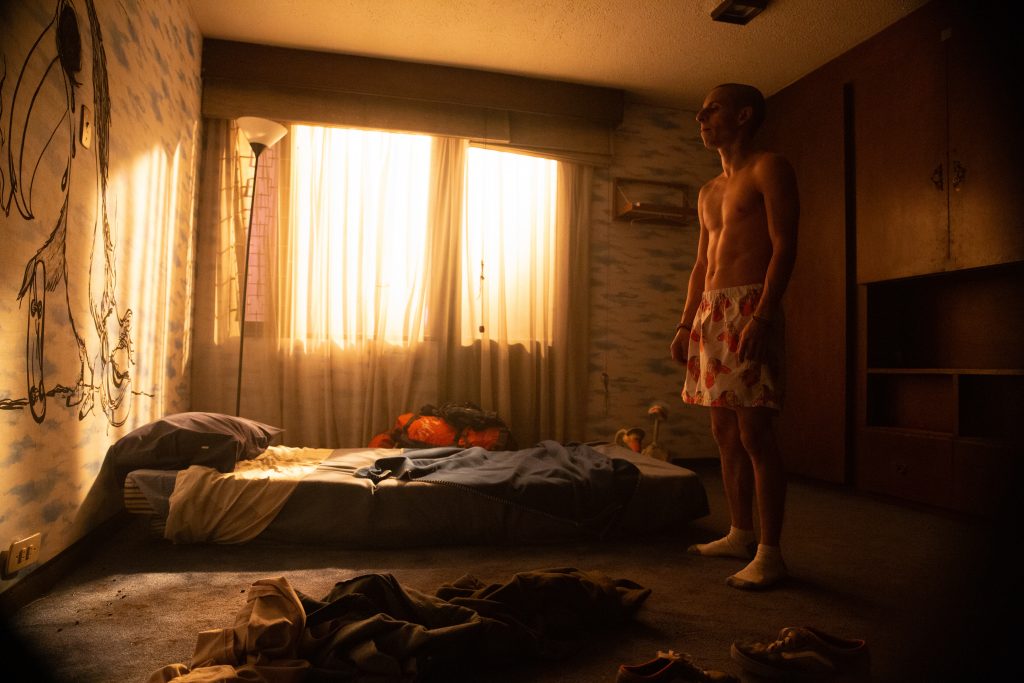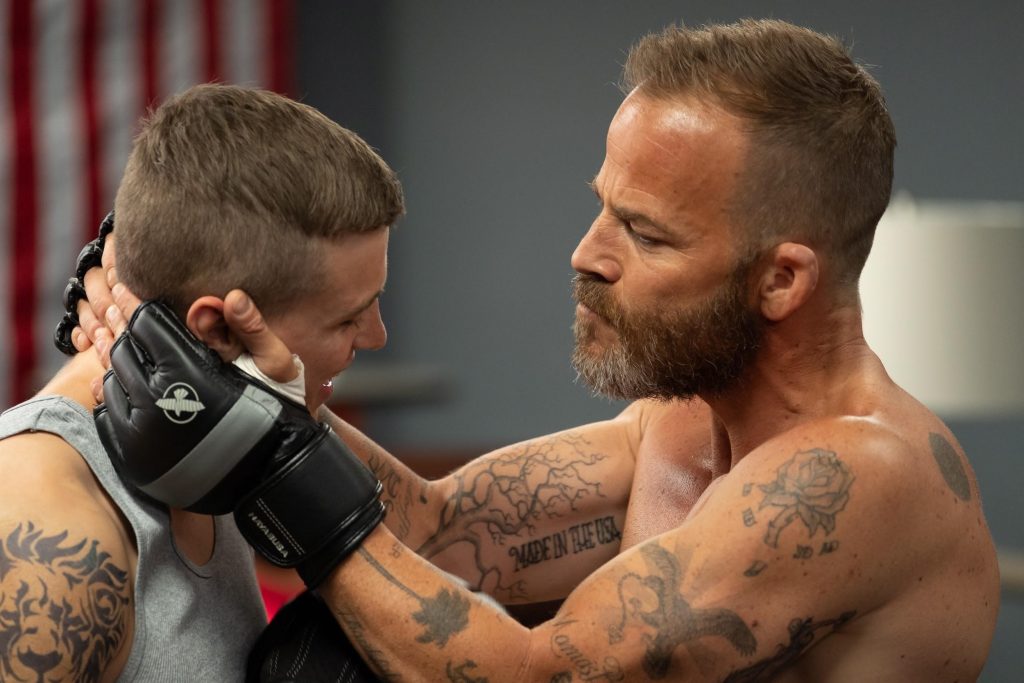May 28, 2021
by Carla Hay

Directed by Esteban Arango
Spanish and English with subtitles
Culture Representation: Taking place in 1999 and 2000 in Colombia and Atlanta, the dramatic film “Blast Beat” features a racially diverse cast of characters (Hispanic, African American, white and Asian) representing the working-class, middle-class and upper-middle-class.
Culture Clash: Two teenage brothers, who have opposite views of the American Dream, emigrate with their mother from Colombia to reunite with the brothers’ father, who is living in Atlanta.
Culture Audience: “Blast Beat” will appeal primarily to people who are interested in well-acted and sometimes melodramatic depictions of Hispanic immigrant stories in the United States.

Is the American Dream a worthy life goal? It depends on who’s answering that question. In the dramatic film “Blast Beat,” two teenage bothers have contrasting opinions of the American Dream, not only because they have polar opposite personalities but also because their lives are going in different directions. Directed by Esteban Arango (who co-wrote the movie’s screenplay with Erick Castrillon), “Blast Beat” has some pacing issues, but the last third of this 105-minute movie is the best part. The credible acting performances of real-life brothers Mateo Arias and Moises Arias also make “Blast Beat” worth watching for people who are interested in gritty family dramas. (“Blast Beat” is based on Arango’s short film of the same name, which also starred Mateo Arias and Moises Arias.)
The “Blast Beat” feature film starts off a little cliché and uninteresting, as viewers are introduced to the two brothers who are at the center of the story. The year is 1999, and brothers Carlos “Carly” Restrepo (played by Mateo Arias) and Mateo “Teo” Restrepo (played by Moises Arias) are living with their mother Nelly Restrepo (played by Diane Guerrero) in an unnamed city in Colombia. Carly is about 17 years old, while Mateo is about 16. The Arias brothers are a lot older than the teenage characters that they portray in this movie, but this noticeable age difference isn’t much of a distraction from the story.
It’s revealed later in the movie that the Restrepo brothers’ father/Nelly’s husband Ernesto (played by Wilmer Valderrama) has been living in Atlanta for about six months. During this time, Colombia has been experiencing increasing political unrest and crime-related violence. Drug lords have been extorting money from private citizens with this ultimatum: “Pay us or we won’t protect you from being assaulted or murdered.”
Ernesto wants his wife and sons to join him in Atlanta, where he has been working menial jobs, such as painting buildings, to make a living. Relocating to Atlanta would mean that Nelly, Carly and Mateo would have to leave behind their middle-class lives and the rest of their family for a more financially unstable lifestyle in the United States, where they don’t know anyone else. The other option would be to stay in Colombia and pay off the local extortionist drug dealers for protection.
Because it’s in the “Blast Beat” movie trailer, it’s not spoiler information to reveal that Nelly makes the choice to move to Atlanta with Carly and Mateo. Nelly says that the family’s immigration lawyer (who’s never seen in the movie) has taken care of all of their asylum paperwork, so that the family can legally immigrate as refugees. She’s willing to start a new life in the United States because she thinks that their Atlanta neighborhood will be safer than in Colombia, and she wants her children to have access to American education.
Carly is excited about the move because he’s an aspiring space engineer whose goal is to graduate from the Georgia Space Institute and eventually work at NASA. Carly is in his last year of high school, so when he moves to Atlanta, he applies to the Georgia Space Institute, and will find out in this story if he has been admitted to the school or not. Mateo, who prefers to live in Colombia, doesn’t have any specific life goals, but he loves to draw and paint, especially graffiti art. He hates the idea of moving away from Colombia to a country where he won’t know anyone but his brother and parents.
Needless to say, Carly and Mateo are complete opposites in almost every possible way. Carly is a dedicated and intelligent student, who excels in math and science the most. He has long hair and loves heavy metal, especially a band called Emperor. Mateo is completely bald (his head is shaved), prefers Colombian pop music, and is a rebellious student who despises school. Mateo shows an inclination and talent to be in the creative arts rather than in science, technology, engineering or mathematics.
Mateo loves skateboarding, while Carly prefers BMX bike riding. Carly has a steady girlfriend named Mafe (played by Kali Uchis), who likes to make homemade videos of Carly doing BMX stunts. Mateo is socially awkward around girls and doesn’t have any romantic prospects in Colombia. And later in the movie, when Mateo is living in Atlanta, it’s strongly implied that he’s a virgin until he ends up having a romance with a schoolmate.
“Blast Beat” spends most of the first third of the film showing Mateo’s and Carly’s lives in Colombia. Young men in Colombia are being recruited to join the military to combat the increasing civil unrest. Mateo’s best friend is a guy around the same age named Norby (played by Cristian Madrigal), who has told Mateo that Norby’s father has paid off people so that Norby doesn’t have to serve in the Colombian Army and will be able to focus on his school studies.
Mateo has already confided in Norby that he doesn’t want to move to the United States. “Fuck the American Dream,” Mateo says bitterly. Norby asks, “Why couldn’t your brother graduate and leave by himself?” Mateo replies, “Because he’s a selfish fucking asshole.”
Mateo and Norby have this conversation outside while Mateo has been spraypainting graffiti on street walls. Predictably, a security guard (played by Jeffrey Hans) sees this illegal graffiti activity and tries to stop it. Mateo and Norby run away, while the security guard chases after them. Mateo has a skateboard for his getaway, while Norby has to flee on foot. The security guard catches up to them, but Norby and Mateo end up assaulting the security guard to get away, and then they hide at Norby’s house.
Their mischief making isn’t over though. Mateo sets off a firecracker in a room, which causes an explosion that happens shortly after Mateo and Norby leave the building. The two pals don’t get in any real trouble over it, but this incident is apparently one of many that has convinced Mateo’s mother Nelly that the family should move to the United States, so that they can start a new life somewhere else.
Nelly fears that Mateo will eventually get himself in too much trouble in Columbia. But she does what many loved ones of troublemakers tend to do when they’re in denial about a problem: They misplace a lot of blame on the troublemaker’s environment instead of seeing that the real issues are with the troublemaker, not where they live. Mateo’s rebellious streak and violent anger aren’t going to go away just because he’s living in another country.
Carly is obviously the favored child in the Restrepo family, because he’s considered to be the obedient brother who’s most likely to succeed. And that’s caused some hard feelings and sibling rivalry between Carly and Mateo. At a family get-together with other relatives, Nelly says that she will never pay extortion money. She also brags that her husband Ernesto will always take care of her, and that he found a “beautiful home in a nice and safe neighborhood” in Atlanta.
Because it takes a while (about 20 minutes) in this 105-minute movie before the story gets to Carly, Mateo and Nelly moving to Atlanta, the Colombian backstory of Carly and Mateo tends to drag for a little too long. There’s a lot of repetition over how much Carly is the “good son” who is eager to move to the United States, while Mateo is the “bad son” who wants to to stay in Colombia.
Before they move to Colombia, Carly tries to tactfully distance himself from Mafe, by telling her that they don’t need to have an exclusive relationship while they’re living in two different countries. She starts to cry because she wants more of a commitment from Carly, even if it’s in a long-distance relationship. Carly isn’t willing to give her that commitment, but he doesn’t want to outright break up with Mafe either. Later in the story, Carly finds out how much he really wants this “non-exclusive” status to apply to his relationship with Mafe.
When Carly, Mateo and Nelly first arrive in Atlanta, the two brothers are polite but emotionally distant with their father. The six months that Ernesto was away has taken an unspoken toll on the relationship that Ernesto has with his sons. Eventually, Carly begins warming up to Ernesto, but Mateo’s relationship with Ernesto is still filled with tension and resentment.
And the “beautiful home” that Nelly thought she would have in Atlanta is anything but that: It’s actually a run-down fixer-upper house, which Ernest says that he plans to renovate, with help from Carly and Mateo. However, Mateo ends up doing more of the physical work than Carly does, because Carly is allowed to spend more time on his schoolwork.
Because Mateo is treated like a second-class citizen in his own family, his resentment comes out in various ways. He gets angry at Ernesto, who gave Mateo a scooter bike instead of the “cool” bike that Carly has. Mateo gripes about the scooter bike: “I’ll look like an idiot on that thing.” Carly has been building a homemade satellite, which he has brought with him to Atlanta. Soon after moving to Atlanta, Mateo destroys the satellite’s solar panels in a fit of anger and jealousy.
When Ernesto asks Mateo what his goals are after high school, he warns Mateo that it better not be anything in the arts, because Ernesto doesn’t think being in the arts is a practical career choice. The only real complaint that Ernesto has about favored son Carly is that he doesn’t like Carly’s taste in heavy metal music, which Ernesto thinks is “satanic” music. Carly has a tendency to play his music too loud, which is why Ernesto doesn’t want Carly to have the bedroom that’s closest to Ernesto and Nelly’s bedroom.
In their American high school, Carly and Mateo have culture shock in different ways. The two brothers also both experience racism and ignorance about Colombian culture, such as people who think that Colombia is part of Mexico, or they don’t like hearing Carly and Ernesto talking to each other in Spanish. Carly and Mateo give polite corrections when people misidentify the brothers’ Colombian nationality, but these corrections are often dismissed or ignored.
Carly is an outstanding student, but his math teacher Mr. Stephens (played by Njema Williams) doesn’t like it when Carly outshines him in the classroom. When Carly suggests a shortcut to a math solution, Mr. Stephens is quick to tell Carly that shortcuts that might have been acceptable where Carly came from, but it’s not acceptable in America. It won’t be the last time that Carly hears variations of the condescending lecture “You’re in America now, and we do things better than other countries.”
As for angry and rebelllious Mateo, it doesn’t take long for him to get in trouble at his new school. In his first day at the Atlanta school, a spoiled and snobby student named Jared (played by Sam Ashby), who looks like a blonde Ken doll, accidentally bumps into Mateo in the boys’ locker room. Mateo calls Jared an “idiot,” while Jared explodes with anger, by getting up in Mateo’s face and calling Mateo a “bitch” and a “chili shitter.” Things calm down before it escalates into a full-on brawl.
A fellow student named Byron (played by Jaime Matthis), who witnessed this argument, warns Mateo not to mess with Jared, because Jared’s father is a lawyer. (It’s at this point in the movie that viewers can easily predict that Mateo is going to run into more problems with Jared.) Byron introduces himself to Mateo in a friendly manner. And later, Mateo ends up becoming friends with Byron and a fellow student named Nessa (played by Ashley Jackson), when they all first bond with each other while smoking marijuana in one of the school’s bathrooms.
“Blast Beat” has a subplot of Carly taking the initiative to visit Georgia Space Institute, where he sits in on a class led by Dr. Michael Onitsuka (played by Daniel Dae Kim), who has connections with people at NASA. Carly is so impressed with Dr. Onitsuka and what’s being taught in the class, that after the classroom session, Carly asks Dr. Onitsuka if he can audit the class. Dr. Onitsuka asks Carly if he’s a registered Georgia Space Institute student. Carly lies and says that he’s a first-year student. Carly has a big space engineering idea that he eventually shares with Dr. Onitsuka, and this idea could make a major impact on Carly’s future career.
Carly and Mateo also find new love interests with fellow classmates in their Atlanta high school. Carly has a mutual attraction to a brainy student named Alana (payed by Ava Capri), who’s in his math class. (Carly doesn’t tell Alana about Mafe.) Meanwhile, Mateo and Nessa become closer and start dating each other. It’s implied that Nessa is Mateo’s first real girlfriend.
But this wouldn’t be a drama if things went smoothly. The rest of the story continues through the school year in 2000. During this school year, Mateo gets into more trouble, and Carly has a lot of resentment over having to look after Mateo and clean up the messes that Mateo makes. And there are some other issues that could threaten the futures of Mateo and Carly. The last third of the movie gets a little melodramatic, but there’s nothing unrealistic that happens in this story.
What makes “Blast Beat” so different from many other stories about Hispanic immigrants in America is that it presents two very different sides of what the American Dream can mean in the same family. Carly represents the view that’s usually presented in movies: The immigrant who wants to move to America to succeed and make a better life. Mateo has a perspective that’s not as commonly seen in American-made movies: An immigrant who unwillingly moved to America and doesn’t see the United States as a “promised land” but as a place that makes him deeply unhappy, with a deep desire to go back to his original country.
It’s this immigrant dichotomy—rather than the somewhat formulaic high school squabbles—that makes “Blast Beat” an interesting movie to watch. It’s impossible to know how differently Mateo Arias and Moises Arias would’ve played these roles if they weren’t brothers in real life, but their brotherly chemistry with each other obviously comes from a place of genuine experiences. The rest of the cast members handle their roles capably, but “Blast Beat” largely depends on the authentic way that the two brothers portray this volatile fraternal relationship.
This emotional truth is why “Blast Beat” is effective on most levels. The movie has some flaws (including an ending that’s just a little too rushed), but “Blast Beat” overall will make a memorable impression on viewers of this unique immigrant family story. The conflicts that these two brothers exeprience have more to do with what they want for themselves and how they want to live on their own terms, rather than based on other people’s expectations.
Vertical Entertainment released “Blast Beat” in select U.S. cinemas and on TV VOD on May 21, 2021. Sony Pictures Home Entertainment released “Blast Beat” on digital and Internet VOD on May 21, 2021.


